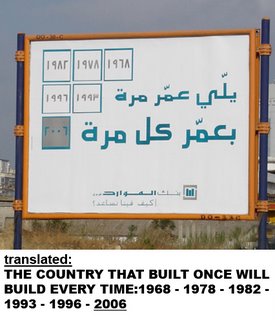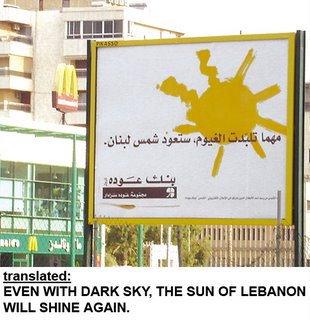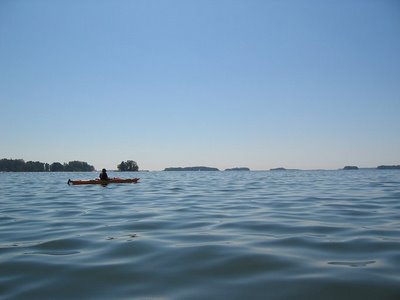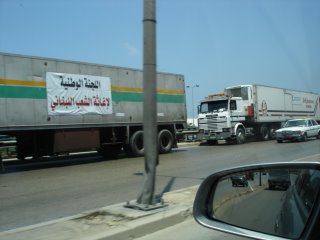This is a report from Mike, he is currently in South America but that's the magic of the interweb-thingy.
I’m in Venezuela at the moment. A long way in distance but I’m still obsessively watching TV. I have only FOX, which is still blindly cheerleading Israel, and CNN, which still lacks precision in its reporting. My Israeli access is from Web newspapers and news from home. Our apartment in Jerus is still full of refugees, apart from my wife’s cousin in Haifa who stubbornly refuses to leave or even go to the bomb shelter.
The conflict won’t leave me behind here, though. On local TV I see Chavez, its president, embracing the Prime Minster of Iran. (The one who’s name I can never spell, but who sees the lost, long dead Shiite Imam in the back of rooms). He may be certifiably mad, but that doesn’t help: the day after Chavez’s visit he was proposing the elimination of Israel as the solution. I have just passed a graffiti sign that said ‘Israel Assinados.’ (President Chavez also visited that great bastion of European democracy, Belarus, to hang with his homey Pres. Lukashenko - Toby.)
I hear about Israeli troops on the ground. Now they are in Lebanon they are over the event horizon: no information can return. I think of the brother of my daughter’s boyfriend. His name is Shimon. He came to Israel to Russia as a child. He’s tall, athletic, blond and blue eyed, and his ambition, like many Israelis kids, was to enter an elite Army unit. He volunteered for a special operations unit. One of the tests for candidates was to be dropped by helicopter into the sea, where they had to hide. The last ones found were selected. He was one of them. In training he aggravated a preexisting injury, and had to leave his unit. Now he is in the infantry.
He came back last week for a brief visit from Lebanon. He was a member of a unit that initially entered Lebanon to capture Maroun-el-Ras. Now he has returned to the machine that kills young men. He will be going into combat with a mobile phone, speed dialed to his parents.
Where he is, Israel lost more combat soldiers yesterday. Many of the regular soldiers are boys, not much past 19 years old. A year ago they were finishing high school. The biggest death rate is amongst their officers. The Israeli army has always been lead from the front.
There is much criticism of the war’s conduct within Israel. Why is the army so slow? To minimise civilian casualties is the reply. "Isn’t this Jenin again?" suggest the critics. They are being listened to and slowly we are moving to a war where, before advancing Israel blasts everything that moves, and most that does not.
There’s no doubt that Hezbollah is the toughest army Israel has met for a very long time. Tactically inept at times, (one Israeli veteran was genuinely perplexed as to why they thought they could take cover behind a tree) but they are suicidally brave, and well dug in, equipped and trained. As someone recently pointed out, there are no POWs in this war. Just dead soldiers on each side.
The international response I find bizarre. It feels as if the whole world turned against Israel. They must see that its very existence is threatened by this fundamentalist Islamic monster. And if they see it, and don’t support Israel’s security, then what other conclusion can I draw that that they agree with its destruction?*
- This war was started by Hezbollah? Then we must have to have an immediate ceasefire to ensure that Hezbollah can stay in place unharmed.
- Hezbollah are funded and trained by Iran? Then Iran must be sure to gain something (a nuclear weapons programme?) to stop its support of Hezbollah.
- Hezbollah is supported by Syria? Then Syria must be rewarded with diplomatic help in its claim to the Golan Heights.
- The Lebanese government relinquishes its military and foreign policy to a terrorist militia? Then it’s to be rewarded with Shebaa Farms, Syrian territory occupied by Israel.
- Israel received an unprovoked attack from Lebanon? It will continue to be threatened across an internationally agreed border.
Some argue that Israel would have done better with more moral force and less military force. Many here thought that countering the Hezbollah attack would be seen by world opinion as a ‘moral’ war, unlike the Palestinean conflict and the 18 years of Lebanese occupation. Well, that period of moral superiority lasted about five minutes. An Israeli diplomat once quipped that the Palestineans ‘never missed an opportunity to miss an opportunity”. Maybe Israel has missed a few opportunities too.
So now Israel is in a strategic box. It’s double or quits time. The only outcome that will work is routing Hezbollah’s military wing and so discrediting its claim to be the saviour of Lebanon. Then Israel can argue from strength, and have an effective veto over the idea to return to the status quo. The UN has no interest in Israel’s security – but that’s not new news. The votes of Israel’s enemies always outvote that of Israel in the UN, whatever the merits of the case.
Without America’s help, and vetos in the Security Council, Israel would now be looking at outlaw status. I’d imagine that more than a few of George W’s business friends are calling him to expedite an end to the war. Intel, Motorola, IBM and other such names have big investments here. The latest Intel chip was designed in their Haifa lab. HP only a couple of weeks ago just bought for 4 billion USD a company of Israeli origin called Mercury. IBM is offering a free month of backup and recovery computer services to companies in the north. Warren Buffet invested in a large Israeli engineering company recently.
Britain is also supportive, although it looks like Blair against everyone else. Israel historically has not trusted the British government. The Foreign Office is believed to still have a Lawrence of Arabia view of the heroic Arabs. Cynics just think that the Arab elite and ex British public schoolboys have interests in common that cannot be named in a family blog.
As well as American capitalism, their God may also be on Israel’s side. (Before you jump, I must assure you I’m not serious: my Ipod is loaded with early Bob Dylan, including the classic ‘Masters of War’.) Large Israeli flags fly over the International Christian Embassy down the road. Their web site informs me that ‘the Scriptures say "the set time has come to favour Zion; when the Lord shall build up Zion He shall appear in His glory".
There is a religious aspect to this conflict apart from Islamic and Christian fundamentalism. Yesterday was the Jewish religious day, called Tish a vav, that mourns the fall of both Jewish Temples. According to tradition the walls of the First and the Second Temples were breached on this day. Other tragedies happened on this day, such as the expulsion of Jews from Spain. I wonder whether Nasrallah and the Iranian PM were aware of the Jewish calendar when they threatened Israel on this special day?
Now there is no third Temple. But modern Israel is seen by most Jews, including secular Jews, as their Third Commonwealth. After waiting 2000 years, I can’t see it being relinquished without a near apocalyptic struggle.
*This being my blog I get the first right of reply to Mike's question. There are clearly many people and some states that do feel Israel has no right to exist but many also do not. It is self-evident to me that the lack of sympathy for Israel stems from the running sore of the occupied territories, leaving aside all of the micro arguments over rights and wrongs and recent developments within the territories. Until the occupation is ended and some sort of equitable two-state solution is negotiated Israel will continue to haemorrhage support from beyond the region whilst storing up a resevoir of hate against it within the Middle East. I would also say that clearly the attempts to find an agreeable UN Security Council resolution to divide the sides and disarm Hezbollah show there is international support for both Lebanon's and Israel's security, although of course both the Lebanese and Israeli publics would be perfectly justified in asking: "why did it take this much death and destruction for you lot to realise this?"
 I'm no fan of Hugo Chavez. He tried in 1992 to stage a coup before getting elected President in 1998. That doesn't really establish your democratic bona fides does it? If you can't become pres of your chosen country by military force then give elected politics a go? So it's really depressing to hear self-described British or Finnish (and presumably many other nationality) left-wingers lauding him because he regularly tells the US where to go but for not too much else.
I'm no fan of Hugo Chavez. He tried in 1992 to stage a coup before getting elected President in 1998. That doesn't really establish your democratic bona fides does it? If you can't become pres of your chosen country by military force then give elected politics a go? So it's really depressing to hear self-described British or Finnish (and presumably many other nationality) left-wingers lauding him because he regularly tells the US where to go but for not too much else. But before anyone asks me for a paypal link to donate into the, I'm sure, already bulging CIA account entitled "for doing what we used to do so well - ousting Latin American lefty leaders" it must be said no one is all bad. The Mayor of Caracas who is a key Chavez supporter has announced he is seizing a number of golf courses in the city to redevelop them as low cost housing. Some say its part of a populist campaign in the run-up to the next presidential election in Venezuela, but perhaps Hugo is like me and just really, really hates golf.
But before anyone asks me for a paypal link to donate into the, I'm sure, already bulging CIA account entitled "for doing what we used to do so well - ousting Latin American lefty leaders" it must be said no one is all bad. The Mayor of Caracas who is a key Chavez supporter has announced he is seizing a number of golf courses in the city to redevelop them as low cost housing. Some say its part of a populist campaign in the run-up to the next presidential election in Venezuela, but perhaps Hugo is like me and just really, really hates golf.














